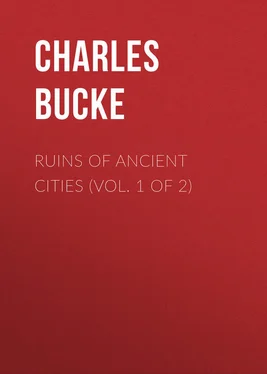Charles Bucke - Ruins of Ancient Cities (Vol. 1 of 2)
Здесь есть возможность читать онлайн «Charles Bucke - Ruins of Ancient Cities (Vol. 1 of 2)» — ознакомительный отрывок электронной книги совершенно бесплатно, а после прочтения отрывка купить полную версию. В некоторых случаях можно слушать аудио, скачать через торрент в формате fb2 и присутствует краткое содержание. Жанр: foreign_antique, foreign_prose, на английском языке. Описание произведения, (предисловие) а так же отзывы посетителей доступны на портале библиотеки ЛибКат.
- Название:Ruins of Ancient Cities (Vol. 1 of 2)
- Автор:
- Жанр:
- Год:неизвестен
- ISBN:нет данных
- Рейтинг книги:4 / 5. Голосов: 1
-
Избранное:Добавить в избранное
- Отзывы:
-
Ваша оценка:
- 80
- 1
- 2
- 3
- 4
- 5
Ruins of Ancient Cities (Vol. 1 of 2): краткое содержание, описание и аннотация
Предлагаем к чтению аннотацию, описание, краткое содержание или предисловие (зависит от того, что написал сам автор книги «Ruins of Ancient Cities (Vol. 1 of 2)»). Если вы не нашли необходимую информацию о книге — напишите в комментариях, мы постараемся отыскать её.
Ruins of Ancient Cities (Vol. 1 of 2) — читать онлайн ознакомительный отрывок
Ниже представлен текст книги, разбитый по страницам. Система сохранения места последней прочитанной страницы, позволяет с удобством читать онлайн бесплатно книгу «Ruins of Ancient Cities (Vol. 1 of 2)», без необходимости каждый раз заново искать на чём Вы остановились. Поставьте закладку, и сможете в любой момент перейти на страницу, на которой закончили чтение.
Интервал:
Закладка:
The majority of the Athenian churches 81 81 Dodwell.
are built upon the ruins of ancient temples, and are composed of blocks of stone and marble, with a great number of inscriptions, altars, pedestals, and architectural ornaments. "As we passed through the town," says Dr. Clarke, "there was hardly a house, that had not some little marble fragments of ancient sculpture stuck in its front, over its door."
At Athens four ancient buildings 82 82 Dodwell.
have been entirely destroyed within these few years; a small Ionic temple in the Acropolis; another temple, supposed to be of Ceres, near the Ilissus, or bridge over that stream, and the aqueduct of Antoninus Pius. Part also of the propylæan columns have been thrown down, with a mass of the architrave on the western front of the Erectheion, and one of the columns of the Olympeion. In fact, more than forty of the temples and public buildings 83 83 Idem.
, which are mentioned by Pausanias, have so totally disappeared, as not to leave a trace, by which it is possible to identify their situation: and this leads us to the Parthenon, which we have purposely left to the last, because the wrong done to it of late years, by a nobleman of Scotland, has been the means of introducing to our own country a taste for the elegant and beautiful, which it never enjoyed before.
"The Parthenon," says Mr. Dodwell, "at first sight rather disappointed my expectations, and appeared less than its fame. The eye, however, soon becomes filled with the magnitude of its dimensions, the beauty of its materials, the exquisite perfection of its symmetry, and the harmonious analogy of its proportions. It is the most unrivalled triumph of sculpture and architecture that the world ever saw. The delight which it inspires on a superficial view is heightened in proportion as it is attentively surveyed. If we admire the whole of the glorious fabric, that admiration will be augmented by a minute investigation of all the ramified details. Every part has been finished with such exquisite purity, that not the smallest instance of negligence can be discovered in the execution of those particulars, which are the least exposed to observation: the most concealed minutiæ of the structure having been perfected, with a sort of pious scrupulosity."
"I pass delicious hours," says M. La Martine, "recumbent beneath the shade of the Propylæa: my eyes fixed on the falling pediment of the Parthenon, I feel all antiquity in what it has produced of divine; the rest is not worth the language that has described it. The aspect of the Parthenon displays, better than history, the colossal grandeur of a people. Pericles ought not to die. What superhuman civilization was that which supplied a great man to command, an architect to conceive, a sculptor to decorate, statuaries to execute, workmen to cut, a people to pay, and eyes to comprehend and admire such an edifice! Where shall we find such a people, or such a period? No where!"
"Let us, in idea, rebuild the Parthenon," continues the same writer; "it is easily done; it has only lost its frieze, and its internal compartments. The external walls, chiselled by Phidias, the columns, and fragments of columns, remain. The Parthenon was entirely built of Pentelic marble, so called from the neighbouring mountain of that name, whence it was taken. It consists of a parallelogram, surrounded by a peristyle of forty-six Doric columns; one column is six feet in diameter at the base, and thirty-four feet high. The columns are placed on the pavement of the temple itself, and have no bases. At each extremity of the temple exists, or did exist, a portico of six columns. The total length of the edifice is two hundred and twenty-eight feet; its width, two hundred feet; its height, sixty-six feet. It only presents to the eye the majestic simplicity of its architectural lines. It was, in fact, one single idea expressed in stone, and intelligible at a glance, like the thoughts of the ancients."
This recalls to our recollection what Plutarch says in respect to Pericles. "The Parthenon was constructed with such admirable judgment, such solidity of workmanship, and such a profound knowledge of the architectural art, that it would have indefinitely defied the ravages of time, if they had not been assisted by the operations of external violence. It is an edifice that seems to have been constructed for eternity. The structures which Pericles raised are the more admirable, as, being completed in so short a time, they yet had such a lasting beauty; for, as they had, when new, the venerable aspect of antiquity, so, now they are old, they have the freshness of a modern work. They seem to be preserved from the injuries of time by a kind of vital principle, which produces a vigour that cannot be impaired, and a bloom that will never fade."
These words of Plutarch were applicable to the Parthenon little more than a century ago, and would still have been so, if it had not found enemies in the successive bigotry of contending religions, in the destruction of war, and the plundering mania of artists and amateurs. The high preservation of those parts, which are still suffered to remain, is truly astonishing! The columns are so little broken, that were it not for the venerable reality of age, they would almost appear of recent construction.
These observations naturally carry us back to the period in which the Parthenon was built. That which was the chief delight of the Athenians, and the wonder of strangers, was the magnificence of their edifices; yet no part of the conduct of Pericles moved the spleen of his adversaries more than this. They insisted that he had brought the greatest disgrace upon the Athenians, by removing the treasures of Greece from Delos, and taking them into his own custody; that he had not left himself even the specious apology of having caused the money to be brought to Athens for its greater security, and to keep it from being seized by the Barbarians; that Greece would consider such an attempt as a manifest tyranny; that the sums they had received from them, upon pretence of their being employed in the war, were laid out by the Athenians in gilding and embellishing their city, in making magnificent statues, and raising temples that cost millions. Nor did they amplify in the matter; for the Parthenon alone cost £145,000. Pericles, 84 84 Rollin.
on the contrary, remonstrated to the Athenians, that they were not obliged to give the allies an account of the money they had received; that it was enough they defended them from the Barbarians, whilst the allies furnished neither soldiers, horses, nor ships. He added, that as the Athenians were sufficiently provided with all things necessary for war, it was but just that they should employ the rest of their riches in edifices and other works, which, when finished, would give immortal glory to their city, and the whole time they were carrying on give bread to an infinite number of citizens: that they themselves had all kinds of materials, as timber, stone, brass, ivory, gold, ebony, and cypress wood; and all sorts of artificers capable of working them, as carpenters, masons, smiths, stone-cutters, dyers, goldsmiths; artificers in ebony, painters, embroiderers, and turners; men fit to conduct their naval affairs, as merchants, sailors, and experienced pilots; others for land carriage, as cartwrights, waggoners, carters, rope-makers, paviors, &c. &c.: that it was for the advantage of the state to employ these different artificers and workmen, who, as so many separate bodies, formed, when united, a kind of peaceable and domestic army, whose different functions and employments diffused gain and increase throughout all ages and sexes: lastly, that, whilst men of robust bodies, and of an age fit to bear arms, whether soldiers or mariners, and those who were in the different garrisons, were supported with the public moneys, it was but just that the rest of the people who lived in the city should also be maintained in their way: and that as all were members of the same republic, they should all reap the same advantages, by doing it services, which, though of a different kind, did, however, all contribute to its security or ornament. One day as the debaters were growing warm, Pericles offered to defray the expense of all these things, provided it should be declared in the public inscriptions, that he only had been at the charge of them. At these words, the people, either admiring his magnanimity, or fired with emulation, and determined not to let him engross that glory, cried, with one voice, that he might take out of the public treasury all the sums that were necessary for his purpose.
Интервал:
Закладка:
Похожие книги на «Ruins of Ancient Cities (Vol. 1 of 2)»
Представляем Вашему вниманию похожие книги на «Ruins of Ancient Cities (Vol. 1 of 2)» списком для выбора. Мы отобрали схожую по названию и смыслу литературу в надежде предоставить читателям больше вариантов отыскать новые, интересные, ещё непрочитанные произведения.
Обсуждение, отзывы о книге «Ruins of Ancient Cities (Vol. 1 of 2)» и просто собственные мнения читателей. Оставьте ваши комментарии, напишите, что Вы думаете о произведении, его смысле или главных героях. Укажите что конкретно понравилось, а что нет, и почему Вы так считаете.












